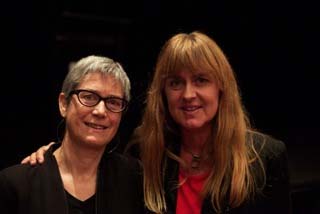
AUCKLAND (Bruce Jesson Foundation / Cafe Pacific / Pacific Media Watch): New Zealand writer/photographer Karen Abplanalp has won the Bruce Jesson Foundation’s $1000 Emerging Journalist Award for an investigation published in Metro magazine in December 2011 about the NZ Superannuation Fund’s investment in the Freeport mine at Grasberg in West Papua.
She was awarded the prize last night by foundation chair Professor Jane Kelsey.
The article was written while she was a postgraduate journalism student with AUT University’s Pacific Media Centre and on the Asia-Pacific Journalism course taught by David Robie. It was also featured in the May 2012 edition of Pacific Journalism Review.
The article, “Blood Money”, asked how the Super Fund could justify investing in a project, owned by US-based mining giant Freeport-McMoRan Copper & Gold Inc, that depended on regular payments to the Indonesian military and other unethical practices.
At least two striking Grasberg miners were shot dead by police in October 2011. The judges' statement said:
The Super Fund defended its investment to Abplanalp, arguing that it had a policy of “engagement” with the mining company to improve its ethical practices.
Human rights breaches
But on September 26 this year the Super Fund announced that it had sold its $1.28 million investment in Freeport McMoRan because of “breaches of human rights standards by security forces around the Grasberg mine, and concerns over requirements for direct payments to government security forces”.
It also sold much smaller investments in three other companies “for severe breaches of the fund’s responsible investment standards where engagement was unlikely to be effective”.
The convenor of the Jesson Foundation’s journalism awards subcommittee, Camille Guy, said Karen Abplanalp’s article was a stunning exemplar of the crucial role of journalism in all countries of holding authority to account.
“If Karen hadn’t investigated the true conditions behind the profits coming out of the Grasberg mine, it is unlikely that more than a handful of New Zealanders would have been aware of what their public pension fund was supporting. NZ Super Fund managers themselves probably did not know the full truth,” Guy said.
“Karen Abplanalp and Metro magazine have performed an important public service in bringing these conditions to light, and I am delighted that the Super Fund has now pulled out of this investment.”
The top Bruce Jesson journalism prize of $4000 for investigative journalism went to Christchurch journalist Rebecca Macfie for a planned book about the Pike River mine disaster.
Macfie, the South Island correspondent for The Listener, has covered the Pike River story ever since 29 miners died on 19 November 2010 in New Zealand’s worst mining disaster in almost a century.
The Jesson journalism prizes, set up after the death of journalist Bruce Jesson in 1999 to support investigative journalism in New Zealand, will contribute $4000 towards Macfie’s costs of researching and writing an in-depth book on the tragedy for Wellington publisher Awa Press.
Macfie will take leave without pay from the Listener to write the book, which will be published next year.
Bruce Jesson Foundation
Karen Abplanalp's article in Metro
Nicky Hager's annual Jesson Lecture
This work is licensed under a Creative Commons Attribution-NonCommercial 3.0 New Zealand Licence.




